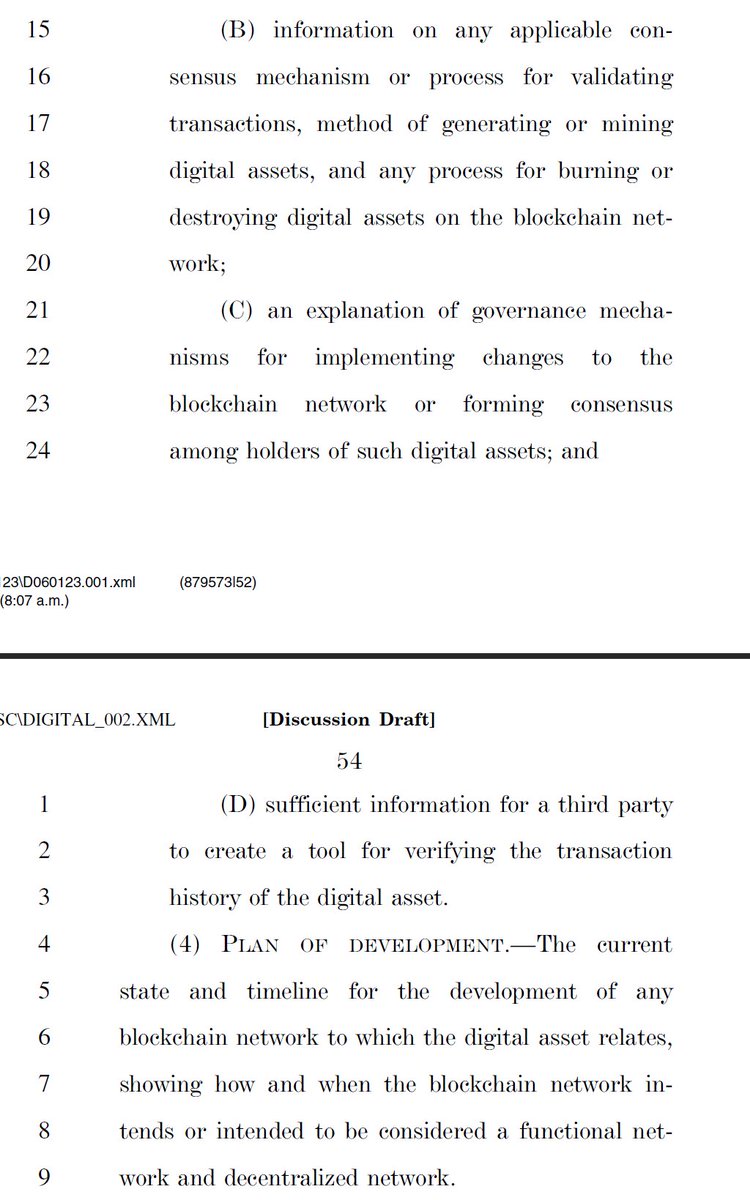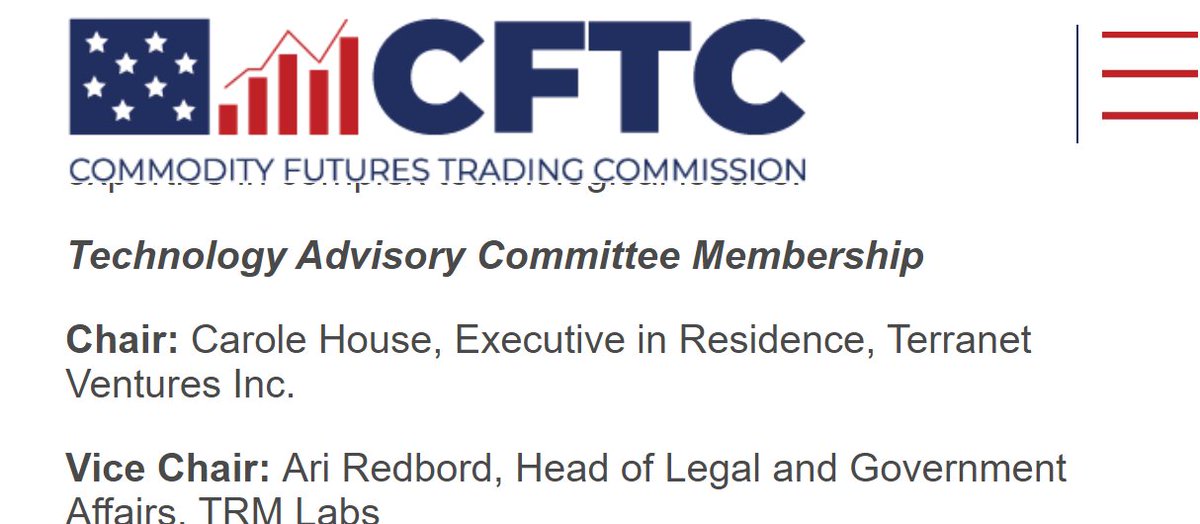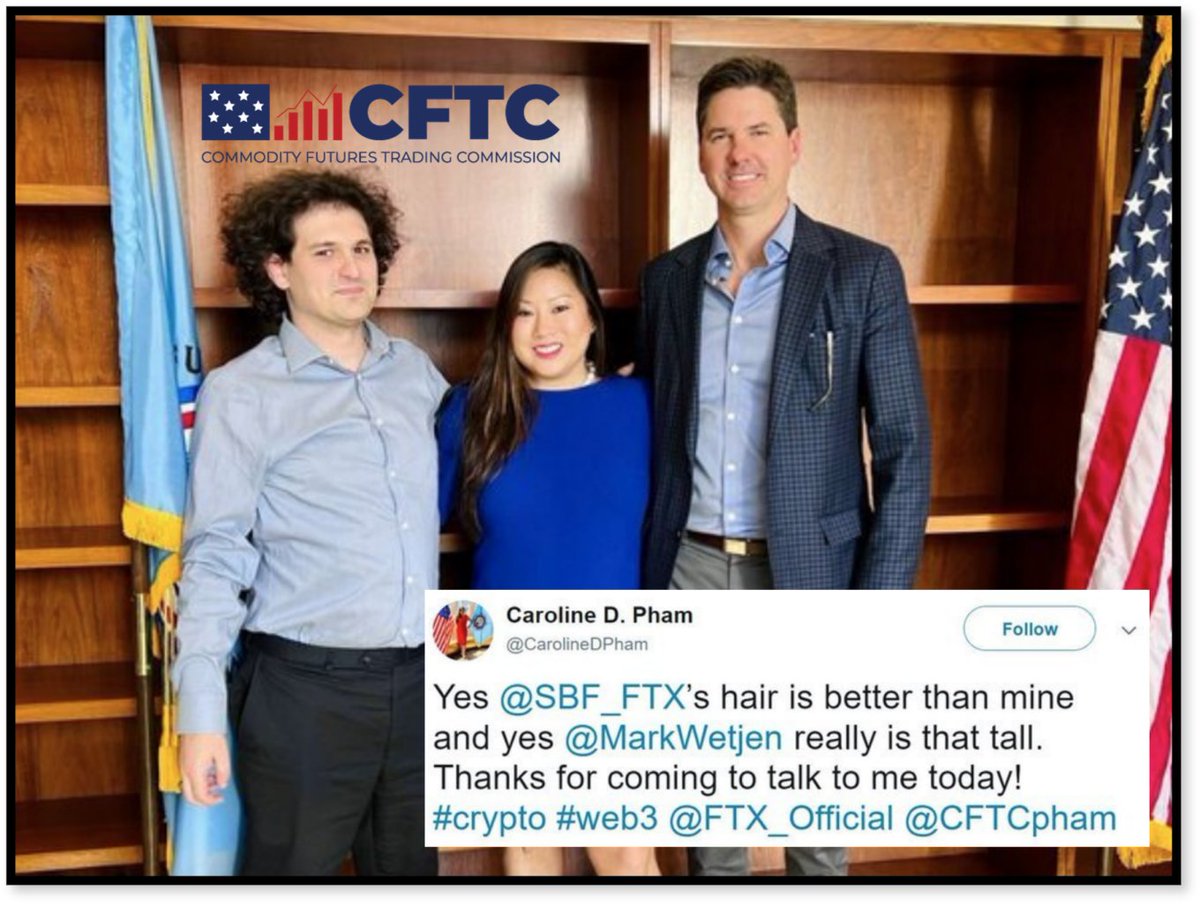okay, as promised, here is my long/stream-of-consciousnessy thread on the proposed crypto market structure bill
CAVEAT: this is one of the most of complex & ambitious financial laws ever written. I might miss stuff. I am paraphrasing some things for ease of readability.

CAVEAT: this is one of the most of complex & ambitious financial laws ever written. I might miss stuff. I am paraphrasing some things for ease of readability.


first, we need to step back & realize what this bill is trying to do-->unlike the EU's MiCA, it is *not* a 'let's figure out how to regulate crypto from scratch from first principles' kind of thing.
Instead, it meets the existing U.S. regulatory landscape where it lives, while seeking to harmonize crypto within it by enabling tokens & related intermediaries to be simultaneously regulated by the CFTC and SEC in different ways
the result is...complicated, confusing, risky & frustrating, but also a good faith, diligent informed effort to make crypto work on its own terms within the U.S.'s incredibly byzantine & otherwise incompatible financial regulatory environment...it's probably our best hope
the bill implicitly adopts 'regulatory functionalism'--under this approach, a given token will sometimes be regulated under the securities laws, and sometimes regulated under the commodities laws--we don't worry whether the token *is* a security or *is* a commodity
I've personally always favored this approach. At one point it was pushed for by Joseph Grundfest, Robert Rosenblum and Wilson Sonsini's token team. It underpinned the Blockstack Reg A+ offering. You can see Grundfest discussing it here:
So, how does this break down?
COMMODITIES:
-->tokens from "end user distributions" (mining, airdrop, etc. for a functional system)
-->tokens intrinsically relating to a functional, decentralized system
-->stablecoins
COMMODITIES:
-->tokens from "end user distributions" (mining, airdrop, etc. for a functional system)
-->tokens intrinsically relating to a functional, decentralized system
-->stablecoins
SECURITIES:
-->insiders' tokens (even if from end user distributions)
-->tokens sold by insiders to third parties, if the relevant system is not yet functional and decentralized
-->insiders' tokens (even if from end user distributions)
-->tokens sold by insiders to third parties, if the relevant system is not yet functional and decentralized
Okay, so what is an "insider" though?
That's my gloss for a token "issuer" & its "related persons" & "affiliated persons". "Issuer" also includes "sponsors"--ie most people who help/benefit from selling the tokens. Essentially, 'insiders' includes everyone close to the project.
That's my gloss for a token "issuer" & its "related persons" & "affiliated persons". "Issuer" also includes "sponsors"--ie most people who help/benefit from selling the tokens. Essentially, 'insiders' includes everyone close to the project.
The rule for insiders is conceptually simple--their sales of tokens are covered by the securities laws in a set of rules modeled after the traditional Reg D / Rule 144 structure for private company equity securities.
This means:
-->They have a 12-month lockup period
-->They can only be sold on SEC-registered cryptosecurities ATSs.
-->For affiliates, there are transactional limits (can't sell more than 1% of o/s supply in any 3 months, etc.)
-->They have a 12-month lockup period
-->They can only be sold on SEC-registered cryptosecurities ATSs.
-->For affiliates, there are transactional limits (can't sell more than 1% of o/s supply in any 3 months, etc.)
Additionally, for issuer sales, there is an annual sales cap of $75M plus some liberal limits on how much can be invested by non-accredited investors.
For insiders to be able to sell their tokens before the blockchain system is functional & decentralized, the issuer needs to do SEC reporting--I won't detail the requirements here, but they seem relevant and manageable 





Once the system is certified as decentralized/functional, the reporting can stop--more on that below ; )
Okay, so what problems does this solve?
-->development companies can sell tokens to raise money--to the public, not just VCs--and even before they are functional
-->development companies can sell tokens to raise money--to the public, not just VCs--and even before they are functional
-->insiders have a clear lockup rule (12 months) and ability to sell tokens on securities ATSs (subject to some limits)--while strict & subject to uncertainties (will these markets have liquidity/work?), this is less strict than applying current Rule 144/144A rules
-->there are clear rules of the road for what development companies have to disclose to & file publicly with the SEC when functioning as a token 'issuer'--token holders will get more / better disclosure...the rules are not as burdensome or irrelevant as for IPOs
-->MOST IMPORTANTLY, there is a clear securities law exemption for "end user distributions"--tokens received by validators, miners, users, etc. for interacting with a functional blockchain system rather than as cash purchases would not be covered by the securities laws 



these are all pretty beneficial things. what's the downside?
-->fragmented markets: insiders' tokens trade on SEC-supervised ATSs, while others' tokens can trade on CFTC-supervised Digital Commodities Exchanges
-->fragmented markets: insiders' tokens trade on SEC-supervised ATSs, while others' tokens can trade on CFTC-supervised Digital Commodities Exchanges
-->SEC still has meaningful authority over important aspects of crypto and could pass implementing regs that are not helpful or (as discussed below) refuse to certify many systems as decentralized/functional
-->insiders might end up having a hard time getting liquidity for their tokens, increasing time-to-liquidity, requiring discounts and lowering attractiveness of being a crypto founder/team--more similar to traditional private-to-public IPO timeline
-->permanent dual regulatory regime: crypto will always have at least "two masters" that teams need to worry about (the CFTC and SEC), often simultaneously...the coordination and harmonization between these two agencies may be imperfect & lead to heavy regulatory burdens
-->because *all* insiders' tokens are functional securities (even if the insiders obtained them as users), CEXs have an epistemological compliance problem & could accidentally treat some insiders' tokens as commodities when securities treatment is required -- h/t @NYcryptolawyer
@NYcryptolawyer I also have a lot of questions around this 'restricted token' status--like can the tokens still be used in voting, staking, etc., even though they are securities and are non-transferable? that's a potential BIG issue that needs to be worked on
@NYcryptolawyer the defined term "decentralized network" is important for a few reasons:
-->it determines when issuers can stop their SEC reporting
-->it determines when tokens sold to the public become freely trading commodities instead of restricted securities


-->it determines when issuers can stop their SEC reporting
-->it determines when tokens sold to the public become freely trading commodities instead of restricted securities



@NYcryptolawyer this is probably the part of the bill I would most criticize---not coincidentally, it is one of the few places where the bill abandons functionalism, instead resorting to arbitrary % limits and so forth--you can find some of my thoughts on it here
https://twitter.com/lex_node/status/1665192039917449216
@NYcryptolawyer what about the overall regulatory environment? regulation of defi? etc.?
well, here I have some concerns as well--the bill *increases* the CFTC's power of over crypto and thus arguably net-increases the overall amount of regulation crypto is subject to
well, here I have some concerns as well--the bill *increases* the CFTC's power of over crypto and thus arguably net-increases the overall amount of regulation crypto is subject to
@NYcryptolawyer both the CFTC and SEC can make new rules pursuant to the authorities granted to them by this bill, and they could try to treat people involved in DeFi as 'intermediaries' that are subject to CFTC/SEC licensing, registration, and regulation
@NYcryptolawyer the SEC could still maintain that smart contracts can't have securities tokens on them (those need to be on an ATS) and the CFTC could maintain that smart contracts are 'trading facilities' that must be registered with the CFTC, comply with AML/KYC, limits on leverage, etc. etc.
@NYcryptolawyer there is one potential protection for this in the bill, but imo it's simply not clear enough for comfort--the provision carving out 'ancillary activities' (including web interfaces, yay!) from regulation--but "solely based on" troubles me quite a bit & leaves ambiguity 



@NYcryptolawyer In any event, notwithstanding some issues, the bill is the first one I feel like strikes a credible balance between adding some guardrails around crypto and letting it potentially thrive.
@NYcryptolawyer There's a lot that should be improved with it, and I plan to engage constructively and provide comments & ideas --hopefully the rest of the rest of the industry will do the same, will work constructively together, and we can get rally around this to 'legalize crypto' in the U.S.
• • •
Missing some Tweet in this thread? You can try to
force a refresh

 Read on Twitter
Read on Twitter














